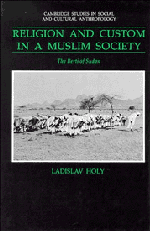Book contents
- Frontmatter
- Contents
- List of illustrations
- Preface and acknowledgements
- Introduction
- 1 The Berti and Islam
- 2 Men and women
- 3 Milk and water
- 4 Village and wilderness
- 5 Custom and religion
- 6 Life cycle
- 7 Circumcision
- 8 Blood and rain
- 9 Custom and superstition
- Glossary
- References
- Index
- Cambridge Studies in Social and Cultural Anthropology
5 - Custom and religion
Published online by Cambridge University Press: 27 August 2009
- Frontmatter
- Contents
- List of illustrations
- Preface and acknowledgements
- Introduction
- 1 The Berti and Islam
- 2 Men and women
- 3 Milk and water
- 4 Village and wilderness
- 5 Custom and religion
- 6 Life cycle
- 7 Circumcision
- 8 Blood and rain
- 9 Custom and superstition
- Glossary
- References
- Index
- Cambridge Studies in Social and Cultural Anthropology
Summary
By expressing the knowledge that procreation is a joint enterprise but that making people grow and giving them health and personality is essentially a feminine role, the customary rituals elaborate in their own way the idea made explicit by women when they talk about themselves as making the men what they are, and thus formulate a different model of gender relations than that of male dominance and female subordination. It is a model which depicts men as dependent on women. The validity of these two models has different sources.
The validity of the model of male dominance and female subordination derives from the fact that it is understood as part of the Islamic tradition and hence as ordained by God. It is frequently justified by reference to the Koran which stipulates that ‘men are in charge of women, because Allah has made the one of them to excel the other’ (Sura 4: 34) and that ‘men are a degree above’ women (2: 24), and it is legitimised by reference to the well-known Koranic injunctions according to which the inheritance shares of women are half those of men (4: 11), and according to which two women have to testify in place of one man (2: 282). Although this model is expressed verbally more often by men than by women, women are not only aware of it but subscribe to it in their everyday conduct without any reservations.
- Type
- Chapter
- Information
- Religion and Custom in a Muslim SocietyThe Berti of Sudan, pp. 129 - 140Publisher: Cambridge University PressPrint publication year: 1991



